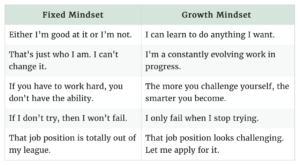Growing up in the United States, adults would occasionally ask, “What do you want to be when you grow up?” It was a fun and exciting question to ponder as a child. Depending on what mood I was in or what television shows I was watching, my answer could range from a professional athlete, a musician, a doctor, or my favorite superhero. The thought of being able to become anything I could dream up was enthralling and empowering.
This question starts as a purely fun exercise an adult uses to converse with little kids. A chance to engage their imagination to picture what great things they could aspire to be. The power of the human imagination is one trait that makes us unique in our world. As we transition from a child to a young adult into adulthood, we tend to stop using our imagination to envision who we could become.
A few weeks ago, I discussed discovering the “true you.” One of the ways we do this is by reflecting on where we get our identity. According to Pastor Craig Groeschel, people often find their identity in three places. These include what others think of us, our worst sins or habits, and our Enemy, Satan.
3 Places We Find Our Identity
- What others think of us
- Our worst sins or habits
- Our Enemy
Discovering our true identity often involves discovering who God created us to be, removing false beliefs, and learning to see ourselves how God sees us. One incredible tool I have found helpful is the Chazown Experience by Life.Church which is based on Pastor Craig Groeschel’s book Chazown. It goes through a process of identifying key events or experiences in your past, core values, and spiritual gifts. There’s much more to it than I can explain in one paragraph or post, so I encourage you to check it out.
Future You
Back to the question, “Who do you want to be when you grow up?” This week focused on what Pastor Craig calls our “Future You.” It answers the question, “Who do I want to be in 5 or 10 years?” Not merely for the sake of dreaming but because we need this Future You to know what we are working towards.
How Does This Apply To Mental Health?
If you have made it this far, you might wonder, “What does this have to do with mental health?” You might think, “Craig, I am all about making positive changes, but I came here for mental health.” I understand, my friend. I would not waste your time if I didn’t think the payoff would be worth it. Everything I have covered so far is about mental health. Let me explain.
Early in my struggle with fear, anxiety, and depression, I wanted answers. I went to doctors, psychologists, and counselors seeking relief. I desperately wanted to speak with professionals I thought might understand. These people study mental health for a good portion of their lives. How can they not know what I need?
Separate Pieces Of The Puzzle
Medical doctors would prescribe and manage medications, but that is all they wanted to discuss. The psychologist studied me like I was a science experiment. The counselors wanted to hear about my past and what got me here. There is nothing wrong with this. They were doing their job, but no one tried calling the others to get on the same page. At no point did they present their treatment plan for me.
Operating In Silos
Each treated my condition in their separate way, but recovery from mental health requires more than just medicine or counseling. It has many layers and requires a team in many cases. There was no one around who was dedicated to being my advocate. There was no one to help me devise a plan for my recovery.
No Plan For Recovery
When I stopped spiraling out of control, not one of them sat me down and said, “Let’s help you develop a plan for the future you.” No one asked, “Who do you see yourself becoming in 1, 5, or 10 years?” Not one asked, “What does recovery look like for you?”
You Need An Advocate
If you do not have someone advocating on your behalf, you will likely spend years going in circles, wondering where the time has gone. In my part of the world, our system is incredibly broken. Mental Health Advocates are desperately needed. You, a friend, or a relative can be your advocate. I talk more about being a Mental Health Advocate here.
Be Prepared To Work
Recovery from mental health struggles requires a lot of work. It is not just one thing that sets someone on the path to recovery. Identity plays a HUGE role! Making changes in your life to move you toward your ‘Future You’ will require understanding the ‘True You’ and the person God created you to be. (Groeschel, 2023)
As we look into these concepts, each will require work as they build on one another. Not one of these lessons is a quick fix. Recovery is a path we decide to take each day.
So, Who Do You Want To Become?
Believing you can change is the first step on the path toward your Future Self. Do you believe who you are today is who you will always be? Can people who experience mental health challenges change? I cannot answer that for everyone, but for me, I once questioned whether I would ever change. I now know that change is possible. I believe each of us can make small changes to improve our situation. So who do you want to become?
What Is A Mindset?
We have been discussing that what we believe about ourselves shapes our behaviors and, ultimately, our actions. Along this same train of thought is the idea of a mindset. A mindset is a set of beliefs that shape how we view the world. According to Stanford Psychologist Dr. Carol Dweck, there are two types of mindsets, a fixed mindset, and a growth mindset.
Fixed Mindset
People with a fixed mindset tend to believe that who they are today is who they will always be. They see ability as something you were born with that cannot be changed. According to Dweck, one of the reasons people get stuck in a fixed mindset is due to unresolved trauma. She explains that a negative experience can impact a person and become identity-forming. (Dweck, 2006)
Do you have a fixed mindset?
Growth Mindset
In contrast to a fixed mindset, a person with a growth mindset believes that talents and abilities are developed over time. People with a growth mindset rarely fixate on now because they see themselves as constantly improving or becoming. They believe they are working towards something better. This ability to not get stuck on where they are now and view themselves as always progressing allows them to push through unfavorable circumstances. (Dweck, 2006)

You Can Change Your Mind.
A bit discouraged because you think you might have a fixed mindset? Not to fear, Dr. Carol Dweck has good news. “Dweck has discovered, through years of research, that people with fixed mindsets can learn to have growth mindsets.” (Groeschel, 2023)
Here’s what the Bible has to say about this topic.
”And I am certain that God, who began the good work within you, will continue his work until it is finally finished on the day when Christ Jesus returns.” Phil. 1:6 NLT
“But God shows undeserved kindness to everyone. That’s why he appointed Christ Jesus to choose you to share in his eternal glory. You will suffer for a while, but God will make you complete, steady, strong, and firm.” 1 Peter 5:10 CEV
It is funny how we often look at scripture and think, “Wow, scripture confirms what science has proven.” When in reality, it is the other way around. In The Power To Change, Pastor Craig Groeschel does an incredible job explaning the Greek verbs used in these passages.
“The verb translated ‘continue his work’ in the Philippians verse is ἐπιτελέσει. The verbs translated ‘make you complete’ and make you ‘strong, and firm’ in the 1 Peter verse are στηρίξει and θεμελιώσει.”
“All three are written in the future tense, meaning the action will be happening tomorrow and the day after and the day after that. And all three are written in the indicative mood, meaning the action is not something hoped for or wished for but something that will, for sure, happen. The good work of transformation God began in you his activity of making you complete, steady, strong, and firm – is something God is doing and will continue to do until his work in you is finally finished.”
Believing What’s Easy VS Having Faith In God’s Goodness
It might be easier to believe that you will always be this way instead of having faith in God’s goodness. We often believe that whatever we are struggling with will always define who we are. This could not be further from the truth. If you struggle to believe what 1 Peter 5:10 says, you are not alone. Sometimes we start to believe that God’s goodness is for everyone but ourselves.
Get Honest With God
If this is you, it is time to have an honest conversation with God. I would encourage you to ask God to help you see evidence of his goodness in your life. It’s okay, God can handle your doubt.
Struggling With Trauma?
If trauma has you stuck in a fixed mindset, maybe it is time to find a good counselor. They can help you make sense of the trauma that is holding you back.
Future You – Who Do You Want To Become?
Maybe it is time to do some reflection on who you want to be in one, five, or ten years. If you are unsure of where to start, take a look at Chazown.
Sources:
[1] Groeschel, C. (2023). The Power to Change: Mastering the Habits That Matter Most. Zondervan.
[2] Dweck, C. S. (2006). Mindset: The New Psychology of Success. Random House.
[3] Cherry, K. (2022, September 20). What Is a Mindset and Why It Matters. Verywell Mind. https://www.verywellmind.com/what-is-a-mindset-2795025


